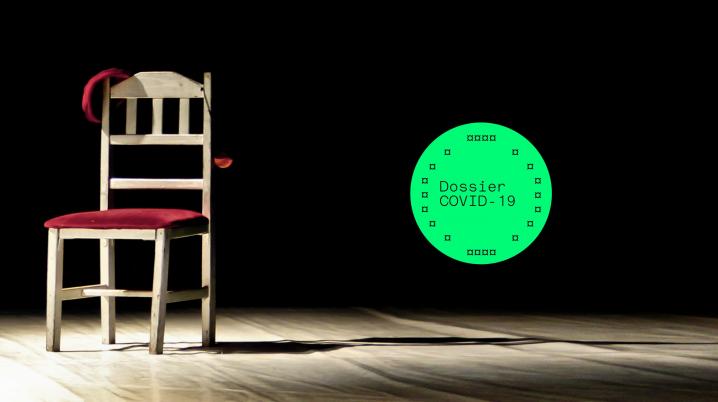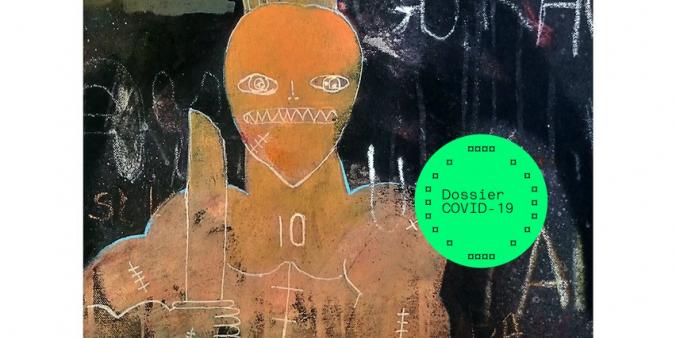
Letter to the Dutch Minister of Education, Culture and Science about the effects of COVID-19
On March 17, a joint letter was sent to Minister van Engelshoven about the consequences of COVID-19 for the cultural and creative sector. It was sent by Kunsten '92 and signed by a broad alliance of organisations and representatives of the sector, including DutchCulture.
Read the contents below (lees hier de brief in het Nederlands).
To the Minister of OCW
Ms I.K. van Engelshoven
Amsterdam, 17 March 2020
Subject: Measures for the cultural and creative sector in response to coronavirus
Dear ms. van Engelshoven,
The cultural and creative sector (including the media) is among the sectors severely affected by the coronavirus crisis and the measures that have been taken to counter its spread. The government has indicated that it will do whatever it takes to cope with the economic consequences of the crisis. The Minister of OCW has pledged in a letter that the interests and concerns of the sector will be recognised and addressed by the state-wide measures being prepared by the government. However, the sector fears that the announced generic measures alone will not be sufficient to cope with the sector’s specific needs and the consequences of the damage suffered. The sector feels supported in this position by the parliamentary motion adopted last week which calls for an extra support package for the cultural and creative sector. It is a sector that contributes 3.8% to the Gross National Product and is an important driver of our economic growth. Creative professionals are not just asking for support, but are also eager to apply their knowledge and innovation power to help solve the problems faced by Dutch society as a whole, as a result of the coronavirus crisis.
It is still too early to understand or to oversee the course of the crisis and its consequences. It is clear nevertheless that a first step needs to be taken. Measures are necessary to prevent self-employed professionals from slipping into financial distress and organisations from going bankrupt. The fact that 60% of the people working in the cultural and creative sector are self-employed adds to the urgency. If no additional support for the sector is provided by the state, provincial and municipal governments, then the consequences are incalculable.
To act in unison as much as possible in this crisis situation, the organisations listed at the bottom of this letter hereby present an initial analysis and action proposal. Kunsten ’92 will serve as a contact point and will inform and involve all parties as much as possible.
Specific attention areas in the cultural and creative sector
- Performing and producing artists, flex workers, self-employed professionals, companies and producers are seeing all their income drop away immediately. This is due to the fact that museums, (pop) music venues, theatres and festivals, both within and outside the publicly funded sector, have had to close their doors and suspend all activities. Festivals are being cancelled, performers are staying away. Scheduled productions cannot be produced and performed.
- Educational activities, both intramural and extramural, have been cancelled since schools have closed down. Work in the amateur sector has ground to a halt, so that thousands of instructors and professionals working as self-employed professionals in all art disciplines have lost their source of income.
- Photographers, content producers, designers, DJs, producers, architects and many other creative professionals are seeing their turnover drastically reduced or ended.
- Monuments that receive visitors or serve as performance venue are suffering losses. This includes, for example, concerts that were to be held in churches, castles and countryside venues.I
- International partnerships and income obtained from international tours or activities by artistic companies and artists have dropped away
The damage suffered by the cultural sector in the short term is currently being assessed. Professional associations and sector organisations will shortly offer Minister van Engelshoven a first overview for the various sectoral domains mentioned above.
Support package to compensate for lost income
The cultural and creative sector calls on the government to set up a robust support package as quickly as possible, similar to the support being organised for other sectors of the economy. This would preferably take the shape of a ‘lean and mean’ support package that can start making benefit pay-outs in the shortest possible term. It is very important to devise a very straightforward scheme that can work for all disciplines and that provides vital compensation for lost income. The requirement in first instance is to provide the necessary support for the entire sector, from individual self-employed professionals to institutions and businesses, and in both the (partly) commercial and publicly-funded domains. Our basic principle is that the package contains measures to support self-employed professionals, but also provides the room and possibility to offer support where income drops away so that chains can continue to operate and all suppliers and performing professionals/artists can be sufficiently compensated. Besides providing compensation for costs incurred and income lost, some form of bridging funding is required as well as a burden reduction from the moment that the sector starts to recover. A follow-up effort should then assess the consequential damages suffered, for instance, a drop in copyright-based income as a result of closed down venues.
Relaxing subsidy criteria and advance payments
Further measures are required, besides the support package. Specifically, the options to relax the performance criteria for projects and cultural grants in the cultural sector should be looked into. After all, the compulsory crisis measures are to some extent making it impossible to achieve certain performance criteria. The request is therefore that the government moves quickly to arrange such relaxation for the BIS (basic infrastructure institutions) and Rijksfondsen (state cultural funds). You have already responded willingly to this request. The Minister of OCW could furthermore decide to call on other public authorities and private funds to take appropriate measures with respect to the criteria to be applied. This is important since the provincial and municipal authorities play a significant role in the sector and will need to contribute to mitigating the damage.
Further measures to be taken need to be thought through and depend in part on the outcome of the damage assessments and how the crisis develops.
Implementation
It would be the sector’s preference to set up the support package for the cultural and creative sector at an arm’s length from the state government and to entrust the task to an organisation capable of acting efficiently and decisively. The Ministry of OCW has said it wishes to have the implementation proceed through the existing infrastructure and systems as much as possible, managed and advised by a small core team of experts on behalf of the sector. This core team will be responsible for setting up the support package. The team will be supported by experts with extensive knowledge and experience regarding the sector, who will work closely with the professional associations and sector organisations to monitor the implementation and accountability. For the implementation, the team can draw on the expertise and support available within the sector, particularly at the Rijksfondsen. A rapid announcement of the support package and setting up a contact point will do much to alleviate the concerns currently felt in the sector.
Task force
The sector has also set up a task force to support the process, which will assess the extent of the damage and elaborate proposals for the allocation scheme. The first task to be performed by this group of specialists is to determine to what extent the generic measures launched by the government can be applied and how these can be implemented in the most effective way. In addition, the task force needs to determine where specific measures are required and what the associated costs are.
The sector advocates as a basic principle that the measures will compensate for lost income so that the chain can continue to operate and all suppliers and performing professionals/artists can be compensated.
A number of principles are important for the task force and the core team:
- The number of tickets sold by performance venues and festivals and an estimation of the anticipated ticket sales and other income (such as catering) can be assessed fairly accurately by the cultural institutions and businesses. This will give a good overview of the income lost by the venues and theatres as well as by the producers, impresarios and mediators, performers, self-employed workers and flex workers, including those working in the institutions’ catering facilities. This broad and diverse category includes the institutions that produce and present independently. Realistic estimates can also be made for museums, galleries and heritage organisations on the basis of experience figures.
- A large number of independently working professionals in the arts and the creative industry cannot be compensated through institutions or projects. They will need to be offered a direct contact point.
- Many agencies in the creative industry are forced to suspend their activities, and assignments for self-employed professionals such as photographers have dropped away immediately. The damage is being assessed by the Federatie Creatieve Industrie, the Kunstenbond and other parties.
- With the aid of LKCA and KNMO, an assessment is being drawn up for the amateur art and cultural education sectors, and possible support allocation schemes are being considered.
- Cancelled international presentations of Dutch artists, companies and firms in the creative sector are being inventoried with the support of DutchCulture. This also applies for international partnerships that have been suspended. The role played by provincial and municipal authorities and private funds and sponsors must also be considered here.
- Compensation awarded through WTV (working time reduction) schemes will be computed and offset in order to accurately determine the damage.
- It applies to all institutions across the sector that the damage does not end directly after the mandatory period of closure. The pre-sale of tickets for the next season is stagnating, so that many institutions will be affected by a lack of liquidity. It is therefore desirable to make interest-free or low-interest credit facilities available. State Secretary Mona Keijzer has already made a low-cost credit facility available. This should also be offered to ANBIs (public interest organisations).
- So-called ‘B3’ institutions that are risk-bearing with regard to unemployment insurances, such as orchestras and the National Opera & Ballet and municipal institutions, require particular attention.
- The legal and tax-related implications of the proposed scheme need to be examined immediately.
- Loyalty initiatives to support makers and institutions, for instance, the call to donate tickets already bought but not used, are sympathetic but fall far short of what is needed.
Finally
This call agrees with the government’s principle of ‘generic where possible, but specific where needed’. We must at all times keep the human dimension in mind. The cultural and creative sector is obviously eager to contribute its inventiveness and energy to the effort to limit the effects of the coronavirus crisis, and not just with regard to its own sector but also on behalf of society as a whole.
We feel supported by the Minster and the government and are confident that, through our concerted effort, we will manage to guide the cultural and creative sector through this difficult time. By protecting and preserving its vital societal and economic value, the sector shall contribute more than ever to a strong, durable and united society.
Sincerely yours,
On behalf of the organisations and representatives of the cultural and creative sector listed below,
Jan Zoet Marianne Versteegh
Chair Kunsten ’92 General Secretary Kunsten ’92
NAPK Nederlandse Associatie voor Podiumkunsten
Museumvereniging
VVTP Vereniging Vrije Theater Producenten
VSCD Vereniging van Schouwburg- en Concertgebouwdirecties
VNPF Vereniging Nederlandse Poppodia en Festivals
De Popcoalitie
Creatieve Coalitie
Kunstenbond
DutchCulture
Federatie Creatieve Industrie
KNMO Muziekkoepel voor instrumentale amateurmuziek in Nederland
Other representatives of the cultural and creative sectors will be involved as much as possible.




